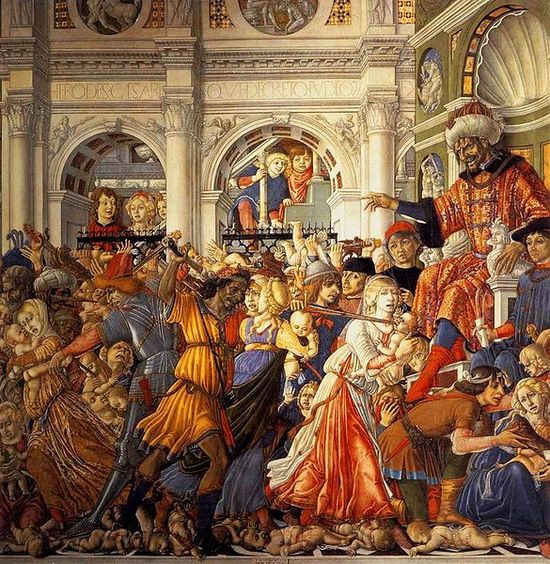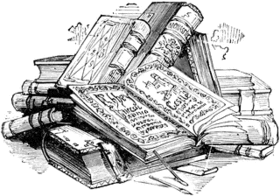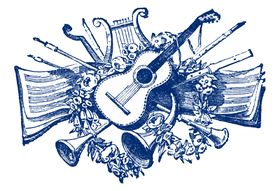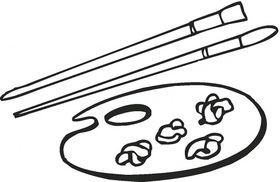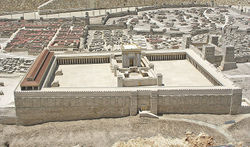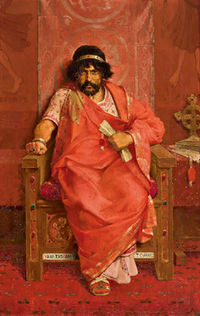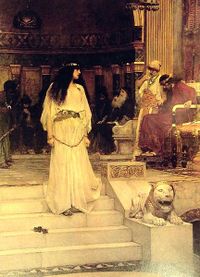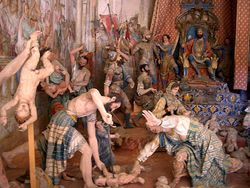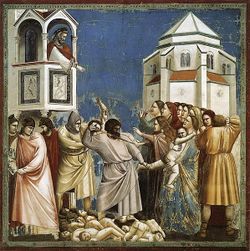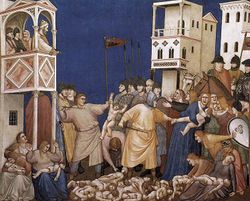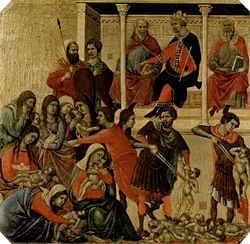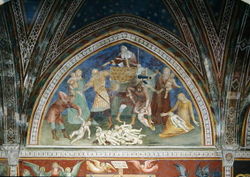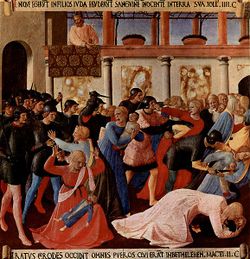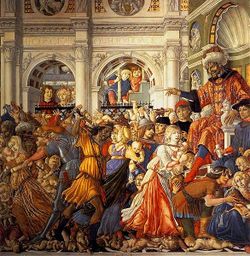Category:Herod the Great (subject)
|
Herod the Great
< Herod the Great (sources) -- Herod the Great (fiction) -- Herod the Great (scholarship) > < Events : Herod & Mariamne -- Adoration of the Magi -- Massacre of the Innocents -- Death of Herod the Great >
Herod the Great -- Overview Herod the Great was the second son of the Idumean Antipater and the Nabatean Cypros; his siblings were Phasael and Salome I. In 47 BCE Antipater was made procurator of Judea by Julius Caesar and appointed his sons Phasael and Herod as governors of Jerusalem and Galilee respectively. In 43 BCE Antipater, who supported Cassius, was poisoned. Herod and Phasael were quick enough to switch allegiance to Mark Antony and retain power. In 40 BCE Herod faced an even greater challenge. The Hasmonean Antigonus allied himself with the Parthians and by deception captured both Phasael and the High Priest John Hyrcanus II. Hyrcanus was mutilated to make him unfit for the office; Phasael committed suicide. Herod fled to Rome; the Senate accepted his plea and elected him King of the Jews with the task of restoring the power of Rome in the region against the Parthians. At the same time, Herod bethroned the granddaughter of John Hyrcanus II, Mariamne, to secure the support of the rival portion of the Hasmoneans to his cause against the Hasmonean Antigonus. Ventidius and Herod were among the generals who most successfully supported Mark Antony's military campaigns which restored and expanded Roman rule in the East. Herod achieved full victory; from 37 BCE to his death in 4 BCE he would be the sole and undisputed ruler of Judea. Herod always remained a loyal ally of the Romans and their leaders. In 34 BCE Mark Antony granted to Cleopatra the balsam plantations near Jericho, parts of Herod’s kingdom. In 32 BCE a civil war between Mark Antony and Cleopatra on one side and Octavian on the other side. Herod, who sided with Mark Antony begun a war against the Nabataeans and defeats them. After the Battle of Actium in 31 BCE, however, Herod was quick in switching his loyalty to Octavian. In 30 BCE Herod met Octavian at Rhodes and he was confirmed as King of Judaea. Moreover, Herod received from Octavian Jericho, given by Mark Antony to Cleopatra, the Decapolis region with the cities of Gadara and Hippos, the Samaria region, and the coastal cities of Gaza, Anthedon, and Straton Tower, made independent by Pompey and Gabinius. The alliance of Herod with the Hasmoneans did not last long. Herod first killed Mariamne's brother, Aristobulus III, whom he had briefly appointed High Priest in 35 BCE. Then in 30 BCE Herod killed John Hyrcanus II, after treacherously inviting to return to Jerusalem from his confinement in Parthia. Ultimately, Mariamne also was executed in 29 BCE. Between 27-25 BCE Herod sent 500 soldiers to Aelius Gallus, Prefect of Egypt in his campaign against Arabia. In 25 BCE, as famine and pestilence devastated the country, Herod appeal to Petronius, Prefect of Egypt, for help. In 23-22 BCE Herod was given by Augustus the Districts of Trachonitis, Batanaea and Auranitis. Herod’s kingdom had by now the same borders of the Hasmonean kingdom at his gratest extension. Later on, in 20 BCE Augustus, when visiting Syria presented Herod with the territory of Zenodorus, which included Ituraea. In 18-17 BCE Herod travelled to Rome to bring home his sons Alexandros and Aristobulus IV. In 15 BCE Marcus Agrippa visited Herod in Jerusalem. The following year, in 14 BCE Herod joined Marcus Agrippa in Asia Minor. There, he was received by the local Jewish communities. In 12 BCE, once more Herod travelled to Rome to accuse his sons Alexandros and Aristobulus IV in front of Octavian at Aquileia. Augustus was succesfull in settling the quarrel. In 10 BCE Herod travelled once more to Rome. In 9 BCE as consequence of the Second War against the Nabataeans, Herod is in disfavour with Augustus. However, by 7 BCE, thanks to the good offices of Nicolaus of Damascus, Herod was once more in favour with the Roman ruler. Herod proved to be a very effective ruler. He completed ambitious construction projects in Jericho, where he edified three palaces in the Wadi Qelt area between 40 and 15 BCE. At Jerusalem, between 20 and 19 BCE he begun the rebuilding of the Temple, which was inaugurated by Herod and Marcus Agrippa in 15 BCE. Herod erected in Jerusalem as well the Antonia Fortress, located in the north western corner of the Temple Mount. In the western part of the city a huge palace, which included three huge towers, named after Mariamne, Phasael and Hyppicos was erected. The city of Samaria was dedicated in 25 BCE as Sebaste in honor of Augustus. In 23 BCE Herod founded the harbor and the city of Caesarea Maritima, dedicated in 10 BCE. New fortresses were erected to defend the kingdom, such as the Herodium and Masada. The succession to his throne proved to be a very complicated matter. With many wives and children, Herod had many options but was not able to control the intrigues and the competition. In 7 BCE Herod had the two sons of Mariamne, Alexandros and Aristobulus IV, executed, along with their maternal grandmother Alexandra the Hasmonean. In 4 BCE the same fate came to his oldest son, Antipater II. The fame of Herod as a fearful and suspicious child murder, which the Gospel of Matthew has left to the Christian tradition, was not totally undeserved. At the end, Herod's kingdom was divided into three parts to be given each to one of his surviving children. Herod Archelaus inherited Judaea, Samaria, and Idumaea; Herod Antipas inherited Galilee and Perea; and Herod Philip the Gaulanitis area. Herod's sister Salome I also was given a portion of inheritance, a toparchy including the cities of Yavneh, Ashdod, Phasaelis, plus 5000 drachmae and a royal habitation at Ashkelon.
References
Related categories External links
Josephus is the major and more detailed source for the life of Herod the Great. |
In Christian iconography Herod was known as the villain in the Massacre of the Innocents but only rarely represented. The "rediscovery" of Josephus at the beginning of the 16th century made him a more complex dramatic character as a powerful, ruthless and jealous king. At the beginning it was his personal life that drew more attention; in particular, his relation with Mariamne, her killing and the killing of their children, provided a narrative full of strong, contrasting passions that was suitable to be presented in novels and on stage. In the 19th century the emphasis began shifting even in fictional accounts on the political role Herod played and on his relations with both the Jews and the Romans. Gabriele Boccaccini, University of Michigan
Highlights
|
Pages in category "Herod the Great (subject)"
The following 108 pages are in this category, out of 108 total.
1
- Der wüterich König Herodes (1552 Sachs), play
- La Mariana (1560 Dolce), play
- Herodes (1567 Goldingham), play
- Herodiados (1622 Bidermann), play
- Herod and Antipater, with the Death of Faire Mariam (1622 Markham/Sampson), play
- Mariamne (1624 Hardy), play
- Herodes infanticida (1632 Heinsius), play
- La strage degl'innocenti (The Slaughter of the Innocents / 1632 Marino), poetry (Italian)
- El mayor monstruo, los celos (1635 Calderón de la Barca), play
- La vida y muerte de Herodes (1636 Molina), play
- La Mariane (1636 Tristan L'Hermite), play
- Moord der onnozelen = Herodes infanticida (1639 @1632 Heinsius), play (Dutch ed.)
- La mort des enfants d'Herode (1639 La Calprenède), play
- Herodes der Kindermörder (Herod the Child Murderer / 1645 Klaj), play
- Mariamne (1650 Manuche), play
- Herodes Ascalonita y la hermosa Mariana (1658 Lozano), play
- Historia Idumaea; seu, De vita & gestis Herodum (1660 Nold), book
- Herodes der Kindermörder (Herod the Child Murderer / 1663 Gryphius), play
- The Wicked Life and Wofull Death of Herod the Great (1664 Clarke), book
- Mariamne (1670 Hallmann), play
- Herod the Great (1672 Boyle), play
- Herod and Mariamne (1673 Pordage), play
- Herodes der Kindermörder (Herod the Child Murderer / 1675 Heinlein / Faber), oratorio
- The Life of Herod the Great (1678 L'Estrange), book
- La Mariamne (Mariamne / 1696 Ruggieri / Burlini), opera (music & libretto), Venice premiere
- Hérode (1709 Nadal), play
- Herodes (Herod the Great / 1718 Schürmann / Müller), opera (music & libretto), Brunswick premiere
- Gli eccessi della gelosia (1722 Albinoni), opera
- (+) Mariamne (1723 Fenton), play
- La Mariane (1724 Albinoni/Porta), opera
- Mariamne (1724 Voltaire), play
- Mariamne (1725 Nadal), play
- Herod the Great (1740 Peck), poetry
- Herodes und Mariamne (1765 Telemann), opera
- Colección de varias historias (1767-1768 Santos Alonso), novel
- Marianne (1793 Compagnoni) = La Mariane (Mariamne / 1636 Tristan L'Hermite), play (Italian ed.)
- Herodes vor Bethlehem (1803 Mahlmann), play
- Irod i Mariamna (1809 Derzhavin), play
- Erode (1815 Scevola), play
- Erode; ossia, Marianna (Herod; or, Mariamne / 1825 Mercadante / Ricciuti), opera (music & libretto), Venice premiere
- Mariamne: The Last of the Asmonean Princesses (1825 Ogle), novel
- Mariamme; or, The Court of Herod the Great (1839 Waller), play
- Herodes der Grosse (Herod the Great / 1844 Rückert), play
- Herod the Great (1849 James), novel
- Herodes der Grosse (Herod the Great / 1853 Neumeister), play
- Mariamne; or, The Queen's Fate (1856 Mair), novel
- The Combat of the People; or, Hillel and Herod (1858 Wise), novel
- The Life and Times of Herod the Great (1860 Willett), book
- Herodes (1862 Franquelo), play
- Sipure Hordus (1863 Dick), novel
- Histoire d'Hérode, roi des Juifs (1867 Saulcy), book
- The Idumean (1869 Leavitt), play
- Mariamne (1873 Osborn), play
- Mayse Hordos (1873 Wohlman), play
- Zipporah, the Jewish Maiden (1876 Bewsher), novel
- Herod (1884 Iliowizi), play
- Hérode (1885 Chaumet), opera
- Herod, King of the Jews (1887 Landau), play
- Herod and Mariamne (1888 Rives), play
- Fun Kleyn tsu der Kroyn (1889 Shaikewitz), novel
- Herodes (1891 Stilgebauer), novel
- Tsar Irod i tsaritsa Mariamna (1893 Aleksandrov), play
- Herod the Great (1896 Solly), play
- Herod (1900 Phillips), play
- Erode I, re degli ebrei (1903 Caraccio), book
- Joachim's Daughter (1903 Kicks), novel
- Di letste Hashmonoim; oder, Kenig Hurdus (1907 Wohlman), play
- Jewish History and Literature under the Maccabees and Herod (1913 Alford), book
- Messias: drei Dichtungen (1920 Wiener), poetry
- Toldot bet-Hordos (1923 Klausner), book
- En idealist (1928 Munk), play
- Queen Mariamne and King Herod (1929 Kranzthor), play
- Der Herodes-Charakter im Englischen Drama (1934 Tomlinson), book
- Hordos u-Miryam (1935 Ben-Or), novel
- Der Edomiter (1935 Rubin), novel
- The Herods of Judaea (1938 Jones), book
- Until the Day Break (1950 Bell), novel
- Kinigin Miryom (1959 Osherowitch), novel
- Hordus ahi (1960 Weinshall), novel
- King Herod (1965 Kay), oratorio
- Herod król Judei (1965 Krawczuk), book
- Herodes und Marianne (1965 Semmelroth / 1849 Hebbel), TV production (play)
- (+) Mariamne (1967 Lagerkvist), novel
- Herod and Mariamne (1967 Lagerkvist / Walford), novel (English ed.)
- Herod: Profile of a Tyrant (1967 Sandmel), book
- Herodes: Bildnis eines Tyrannen (1968 Sandmel / Bracher), book (German ed.)
- Hordos ha-Adomi (1969 Amichal Yeivin), play
- König Herodes: Der Mann und sein Werk (1969 Schalit), book (German ed.)
- Erode il "Grande" (1972 Cianchi), play
- Greater Herodium (1981 Netzer), book
- The Death of Herod: An Essay in the Sociology of Religion (1992 Fenn), book
- Herod the Great (1996 Green), non-fiction book
- The Herodian Dynasty (1998 Kokkinos), book
- The Building Program of Herod the Great (1998 Roller), book
- La Puerta de Damasco (1999 Piñero Sáenz), novel
2
- What Killed Herod? (2005 Jacobovici), documentary
- Out-Heroding Herod (2006 Landau), book
- The Real Herod (2006 Levy), documentary
- The Architecture of Herod, the Great Builder (2006 Netzer), book
- Erode il Grande (2007 Günther / Dorelli), book (Italian ed.)
- King Herod: A Persecuted Persecutor (2007 Kasher, Witztum / Gold), book (English ed.)
- הורדוס : מלך רודף ורדוף (King Herod: A Persecuted Persecutor / 2007 Kasher, Witztum), book
- Herodes el Grande (2007 Piñero Sáenz), novel
- Herod’s Judaea: A Mediterranean State in the Classical World (2008 Rocca), book
- The Army of Herod the Great (2009 Rocca), book
- Hérode le Grand: constructions, mouvements spirituels ou religieux de son époque (2010 Laperrousaz), book
- The Coins of Herod (2011 Ariel, Fontanille), book
- Herod: The Man Who Had to Be King (2012 Shulewitz), novel
Media in category "Herod the Great (subject)"
The following 14 files are in this category, out of 14 total.
- 1604 * Cary (play).jpg 354 × 500; 59 KB
- 1849 * Hebbel (play).jpg 1,200 × 1,695; 260 KB
- 1940 * Valency.jpg 309 × 486; 18 KB
- 1956 * Perowne.jpg 816 × 1,288; 167 KB
- 1959 Tourjansky (film).jpg 299 × 472; 161 KB
- 1971 * Grant.jpg 673 × 1,000; 175 KB
- 1996 * Richardson.jpg 316 × 474; 37 KB
- 2013 Gelb.jpg 333 × 499; 36 KB
- 2014 Vermes.jpg 396 × 499; 65 KB
- 2015 Marshak.jpg 333 × 499; 43 KB
- 2018 Richardson Fischer.jpg 331 × 499; 37 KB
- 2021 Czajkowski, Eckhardt.jpg 400 × 604; 231 KB
- 2022 Parmentier.jpg 400 × 600; 36 KB
- 2024 Goodman.jpg 400 × 570; 226 KB
